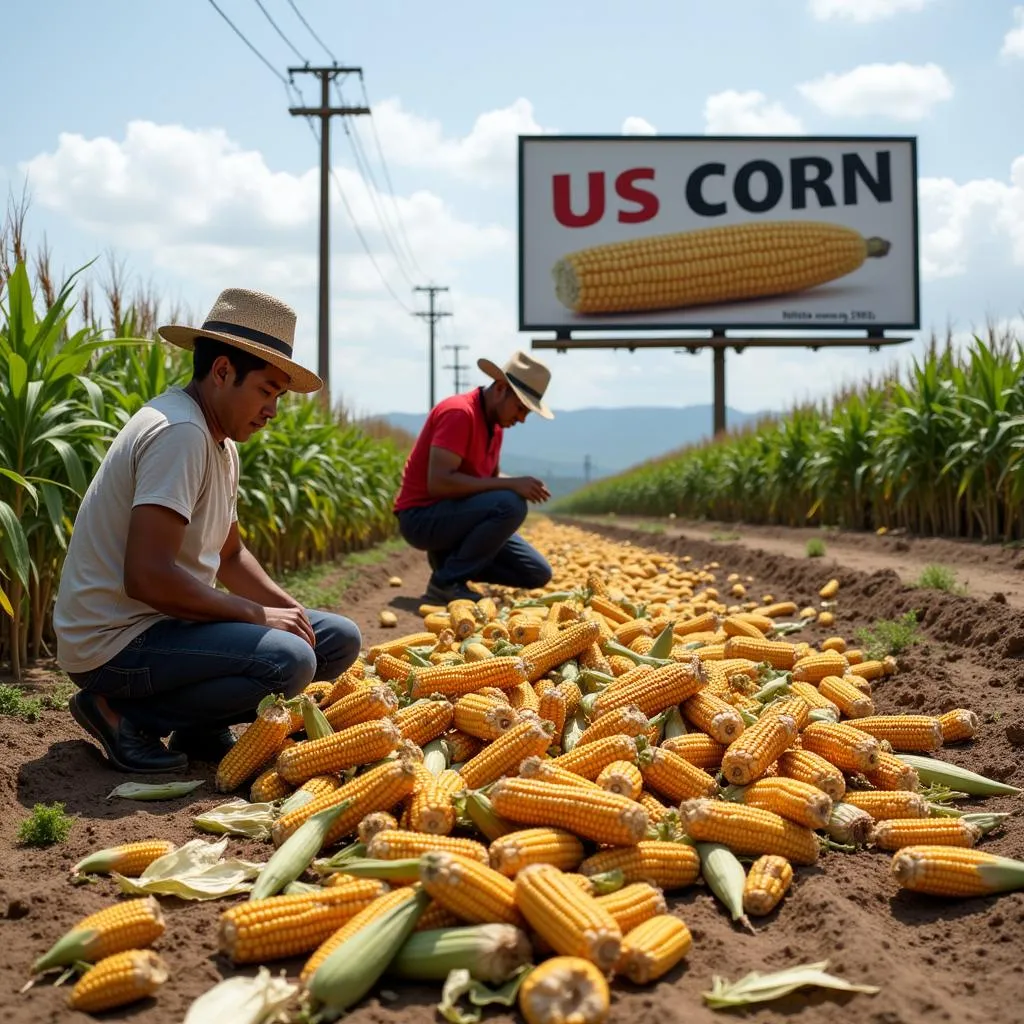The topic of global trade agreements and their effects on local agriculture is a recurring theme in IELTS Writing Task 2. Based on an analysis of past exams and current trends, this subject is likely to appear frequently in future tests. Its relevance to international economic policies and food security makes it a prime candidate for examination. Let’s explore a sample question that closely resembles those encountered in actual IELTS exams:
Some people believe that global trade agreements have had a negative impact on local agriculture in many countries. To what extent do you agree or disagree with this statement?
Analyzing the Question
This question requires candidates to consider the relationship between global trade policies and local farming practices. Key points to address include:
- The nature of global trade agreements
- The potential positive and negative impacts on local agriculture
- The extent to which you agree or disagree with the statement
- Supporting evidence and examples
The role of international trade in reducing poverty is closely related to this topic, as agricultural policies can significantly affect rural economies.
Sample Essay 1 (Band 8)
Global trade agreements have undoubtedly transformed the landscape of agriculture worldwide, and while some argue that these changes have been detrimental to local farming communities, I partially disagree with this assertion. Although there are certainly challenges posed by international trade policies, I believe that the overall impact has been more positive than negative for local agriculture in many countries.
Firstly, it is important to acknowledge that global trade agreements have indeed created difficulties for some local farmers. The influx of cheaper imported goods has often made it harder for small-scale producers to compete in their domestic markets. For instance, Mexican corn farmers faced significant hardships following the implementation of NAFTA, as they struggled to match the prices of heavily subsidized U.S. corn imports. This scenario has played out in various forms across different countries and agricultural sectors.

However, I contend that the benefits of global trade agreements for local agriculture often outweigh these challenges. Trade liberalization has opened up new markets for farmers, allowing them to export their produce to a wider customer base and potentially earn higher profits. For example, Chilean fruit growers have thrived under free trade agreements, exporting high-quality produce to markets in North America and Europe. Additionally, increased competition has often led to innovation and improved efficiency in local agricultural practices, ultimately benefiting both farmers and consumers.
Moreover, global trade agreements have facilitated the transfer of agricultural technologies and knowledge across borders. This exchange has enabled local farmers to adopt more advanced farming techniques, improve crop yields, and diversify their produce. In India, for instance, the liberalization of the seed market has allowed farmers access to a wider variety of high-yielding and pest-resistant crop varieties, contributing to increased productivity and food security.
In conclusion, while it is undeniable that global trade agreements have presented challenges for some local agricultural sectors, I believe that their overall impact has been more beneficial than harmful. The opportunities for market expansion, technological advancement, and increased efficiency have the potential to strengthen local agriculture in the long term. However, it is crucial for policymakers to implement supportive measures to help local farmers adapt to the changing global market and maximize the benefits of trade liberalization.
(Word count: 392)
Sample Essay 2 (Band 7)
Global trade agreements have significantly impacted local agriculture in many countries, and while there are both positive and negative consequences, I tend to agree that the overall effect has been more harmful than beneficial for local farming communities.
One of the main negative impacts of global trade agreements on local agriculture is the increased competition from cheaper imported products. When trade barriers are lowered, local farmers often struggle to compete with large-scale, heavily subsidized agricultural producers from other countries. For example, small-scale rice farmers in Southeast Asian countries have faced difficulties due to the influx of cheaper rice imports from larger producers like Thailand and Vietnam. This competition can lead to reduced incomes for local farmers and, in some cases, the abandonment of traditional farming practices.
Furthermore, global trade agreements can lead to a loss of agricultural diversity. As countries specialize in crops that give them a comparative advantage in the global market, there is a risk of losing traditional crop varieties and farming methods. This specialization can make local food systems more vulnerable to price fluctuations and environmental changes. For instance, the promotion of cash crops for export in some African countries has led to a decline in the cultivation of traditional, drought-resistant crops that are important for local food security.
However, it is important to acknowledge that global trade agreements have also brought some benefits to local agriculture. They have opened up new markets for farmers, allowing them to sell their products to a wider range of customers and potentially earn higher profits. Additionally, increased trade has facilitated the transfer of agricultural technologies and knowledge, which can help improve farming practices and increase productivity.
Despite these advantages, I believe that the negative impacts of global trade agreements on local agriculture outweigh the positives in many cases. The challenges faced by small-scale farmers in competing with large international producers and the potential loss of agricultural diversity are significant concerns that need to be addressed.
In conclusion, while global trade agreements have brought some benefits to the agricultural sector, their overall impact on local farming communities has been largely negative. To mitigate these effects, it is crucial for governments to implement policies that protect local farmers and preserve agricultural diversity while still participating in the global market.
(Word count: 374)
Explaining the Scoring
Band 8 Essay
This essay demonstrates excellent writing skills and a sophisticated approach to the topic, earning it a Band 8 score:
- Task Response: The essay fully addresses all parts of the task, presenting a clear position and well-developed arguments.
- Coherence and Cohesion: Ideas are logically organized with clear progression throughout the essay. Paragraphs are well-linked, and cohesive devices are used effectively.
- Lexical Resource: A wide range of vocabulary is used accurately and appropriately, with good control of less common words.
- Grammatical Range and Accuracy: A variety of complex structures are used with flexibility and accuracy. Errors are rare and do not impede communication.
Band 7 Essay
This essay shows good writing skills but with some limitations compared to the Band 8 essay:
- Task Response: The essay addresses all parts of the task, but some aspects are covered more thoroughly than others.
- Coherence and Cohesion: There is a clear overall progression, but some paragraphs could be better linked.
- Lexical Resource: A sufficient range of vocabulary is used, with some less common items, but there is less sophistication compared to the Band 8 essay.
- Grammatical Range and Accuracy: A mix of simple and complex sentence forms is used, with good control overall, but there is less variety than in the Band 8 essay.
Key Vocabulary to Remember
- Trade liberalization (noun) – /treɪd ˌlɪbərəlaɪˈzeɪʃən/ – The removal or reduction of restrictions or barriers on the free exchange of goods between nations.
- Comparative advantage (noun) – /kəmˈpærətɪv ədˈvæntɪdʒ/ – The ability of an individual or group to carry out a particular economic activity more efficiently than another activity.
- Agricultural diversity (noun) – /ˌæɡrɪˈkʌltʃərəl daɪˈvɜːrsəti/ – The variety of crops, livestock, and farming methods used in agriculture.
- Subsidized (adjective) – /ˈsʌbsɪdaɪzd/ – Supported with a subsidy (financial aid from a government).
- Food security (noun) – /fuːd sɪˈkjʊərəti/ – The state of having reliable access to a sufficient quantity of affordable, nutritious food.
- Cash crops (noun) – /kæʃ krɒps/ – Crops grown for sale rather than for use by the grower.
- Trade barriers (noun) – /treɪd ˈbæriəz/ – Government-imposed restrictions on international trade.
- Influx (noun) – /ˈɪnflʌks/ – An arrival or entry of large numbers of people or things.
The role of governments in ensuring food security is closely related to the impact of global trade agreements on local agriculture, as policymakers must balance international trade commitments with domestic agricultural needs.
Conclusion
The impact of global trade agreements on local agriculture is a complex and nuanced topic that is likely to remain relevant in IELTS Writing Task 2. To prepare for potential questions on this subject, consider practicing with variations such as:
- Discuss the role of government in protecting local agriculture in the face of global trade agreements.
- Some argue that global trade agreements benefit large-scale farmers more than small-scale farmers. To what extent do you agree or disagree?
- How can countries balance the benefits of participating in global trade with the need to protect local agricultural practices?
We encourage you to practice writing essays on these topics and share them in the comments section below. This active engagement will help you refine your writing skills and prepare effectively for the IELTS Writing Task 2.
